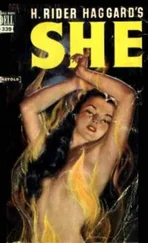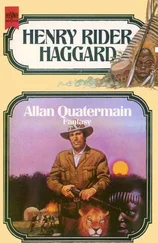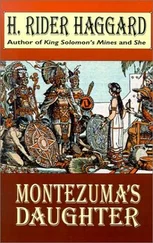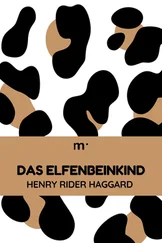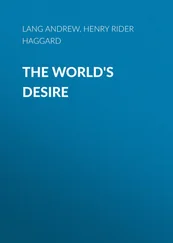[1] There is a known species of magnolia with pink flowers. It is indigenous in Sikkim, and known as Magnolia Campbellii.—Editor.
After breakfast we started to look about us. We were on a strip of dry land about two hundred yards broad by five hundred long, bordered on one side by the river, and on the other three by endless desolate swamps, that stretched as far as the eye could reach. This strip of land was raised about twenty-five feet above the plain of the surrounding swamps and the river level: indeed it had every appearance of having been made by the hand of man.
“This place has been a wharf,” said Leo, dogmatically.
“Nonsense,” I answered. “Who would be stupid enough to build a wharf in the middle of these dreadful marshes in a country inhabited by savages—that is, if it is inhabited at all?”
“Perhaps it was not always marsh, and perhaps the people were not always savage,” he said drily, looking down the steep bank, for we were standing by the river. “Look there,” he went on, pointing to a spot where the hurricane of the previous night had torn up one of the magnolia trees by the roots, which had grown on the extreme edge of the bank just where it sloped down to the water, and lifted a large cake of earth with them. “Is not that stonework? If not, it is very like it.”
“Nonsense,” I said again, but we clambered down to the spot, and got between the upturned roots and the bank.
“Well?” he said.
But I did not answer this time. I only whistled. For there, laid bare by the removal of the earth, was an undoubted facing of solid stone laid in large blocks and bound together with brown cement, so hard that I could make no impression on it with the file in my shooting-knife. Nor was this all; seeing something projecting through the soil at the bottom of the bared patch of walling, I removed the loose earth with my hands, and revealed a huge stone ring, a foot or more in diameter, and about three inches thick. This fairly staggered me.
“Looks rather like a wharf where good-sized vessels have been moored, does it not, Uncle Horace?” said Leo, with an excited grin.
I tried to say “Nonsense” again, but the word stuck in my throat—the ring spoke for itself. In some past age vessels had been moored there, and this stone wall was undoubtedly the remnant of a solidly constructed wharf. Probably the city to which it had belonged lay buried beneath the swamp behind it.
“Begins to look as though there were something in the story after all, Uncle Horace,” said the exultant Leo; and reflecting on the mysterious negro’s head and the equally mysterious stonework, I made no direct reply.
“A country like Africa,” I said, “is sure to be full of the relics of long dead and forgotten civilisations. Nobody knows the age of the Egyptian civilisation, and very likely it had offshoots. Then there were the Babylonians and the Phœnicians, and the Persians, and all manner of people, all more or less civilised, to say nothing of the Jews whom everybody ‘wants’ nowadays. It is possible that they, or any one of them, may have had colonies or trading stations about here. Remember those buried Persian cities that the consul showed us at Kilwa.” [2]
[2] Near Kilwa, on the East Coast of Africa, about 400 miles south of Zanzibar, is a cliff which has been recently washed by the waves. On the top of this cliff are Persian tombs known to be at least seven centuries old by the dates still legible upon them. Beneath these tombs is a layer of débris representing a city. Farther down the cliff is a second layer representing an older city, and farther down still a third layer, the remains of yet another city of vast and unknown antiquity. Beneath the bottom city were recently found some specimens of glazed earthenware, such as are occasionally to be met with on that coast to this day. I believe that they are now in the possession of Sir John Kirk.—Editor.
“Quite so,” said Leo, “but that is not what you said before.”
“Well, what is to be done now?” I asked, turning the conversation.
As no answer was forthcoming we walked to the edge of the swamp, and looked over it. It was apparently boundless, and vast flocks of every sort of waterfowl flew from its recesses, till it was sometimes difficult to see the sky. Now that the sun was getting high it drew thin sickly looking clouds of poisonous vapour from the surface of the marsh and from the scummy pools of stagnant water.
“Two things are clear to me,” I said, addressing my three companions, who stared at this spectacle in dismay: “first, that we can’t go across there” (I pointed to the swamp), “and, secondly, that if we stop here we shall certainly die of fever.”
“That’s as clear as a haystack, sir,” said Job.
“Very well, then; there are two alternatives before us. One is to ‘bout ship, and try and run for some port in the whale-boat, which would be a sufficiently risky proceeding, and the other to sail or row on up the river, and see where we come to.”
“I don’t know what you are going to do,” said Leo, setting his mouth, “but I am going up that river.”
Job turned up the whites of his eyes and groaned, and the Arab murmured “Allah,” and groaned also. As for me, I remarked sweetly that as we seemed to be between the devil and the deep sea, it did not much matter where we went. But in reality I was as anxious to proceed as Leo. The colossal negro’s head and the stone wharf had excited my curiosity to an extent of which I was secretly ashamed, and I was prepared to gratify it at any cost. Accordingly, having carefully fitted the mast, restowed the boat, and got out our rifles, we embarked. Fortunately the wind was blowing on shore from the ocean, so we were able to hoist the sail. Indeed, we afterwards found out that as a general rule the wind set on shore from daybreak for some hours, and off shore again at sunset, and the explanation that I offer of this is, that when the earth is cooled by the dew and the night the hot air rises, and the draught rushes in from the sea till the sun has once more heated it through. At least that appeared to be the rule here.
Taking advantage of this favouring wind, we sailed merrily up the river for three or four hours. Once we came across a school of hippopotami, which rose, and bellowed dreadfully at us within ten or a dozen fathoms of the boat, much to Job’s alarm, and, I will confess, to my own. These were the first hippopotami that we had ever seen, and, to judge by their insatiable curiosity, I should judge that we were the first white men that they had ever seen. Upon my word, I once or twice thought that they were coming into the boat to gratify it. Leo wanted to fire at them, but I dissuaded him, fearing the consequences. Also, we saw hundreds of crocodiles basking on the muddy banks, and thousands upon thousands of water-fowl. Some of these we shot, and among them was a wild goose, which, in addition to the sharp-curved spurs on its wings, had a spur about three-quarters of an inch long growing from the skull just between the eyes. We never shot another like it, so I do not know if it was a “sport” or a distinct species. In the latter case this incident may interest naturalists. Job named it the Unicorn Goose.
About midday the sun grew intensely hot, and the stench drawn up by it from the marshes which the river drains was something too awful, and caused us instantly to swallow precautionary doses of quinine. Shortly afterwards the breeze died away altogether, and as rowing our heavy boat against stream in the heat was out of the question, we were thankful enough to get under the shade of a group of trees—a species of willow—that grew by the edge of the river, and lie there and gasp till at length the approach of sunset put a period to our miseries. Seeing what appeared to be an open space of water straight ahead of us, we determined to row there before settling what to do for the night. Just as we were about to loosen the boat, however, a beautiful waterbuck, with great horns curving forward, and a white stripe across the rump, came down to the river to drink, without perceiving us hidden away within fifty yards under the willows. Leo was the first to catch sight of it, and, being an ardent sportsman, thirsting for the blood of big game, about which he had been dreaming for months, he instantly stiffened all over, and pointed like a setter dog. Seeing what was the matter, I handed him his express rifle, at the same time taking my own.
Читать дальше

